The Heart of Resilience
Life with Down Syndrome During Conflict
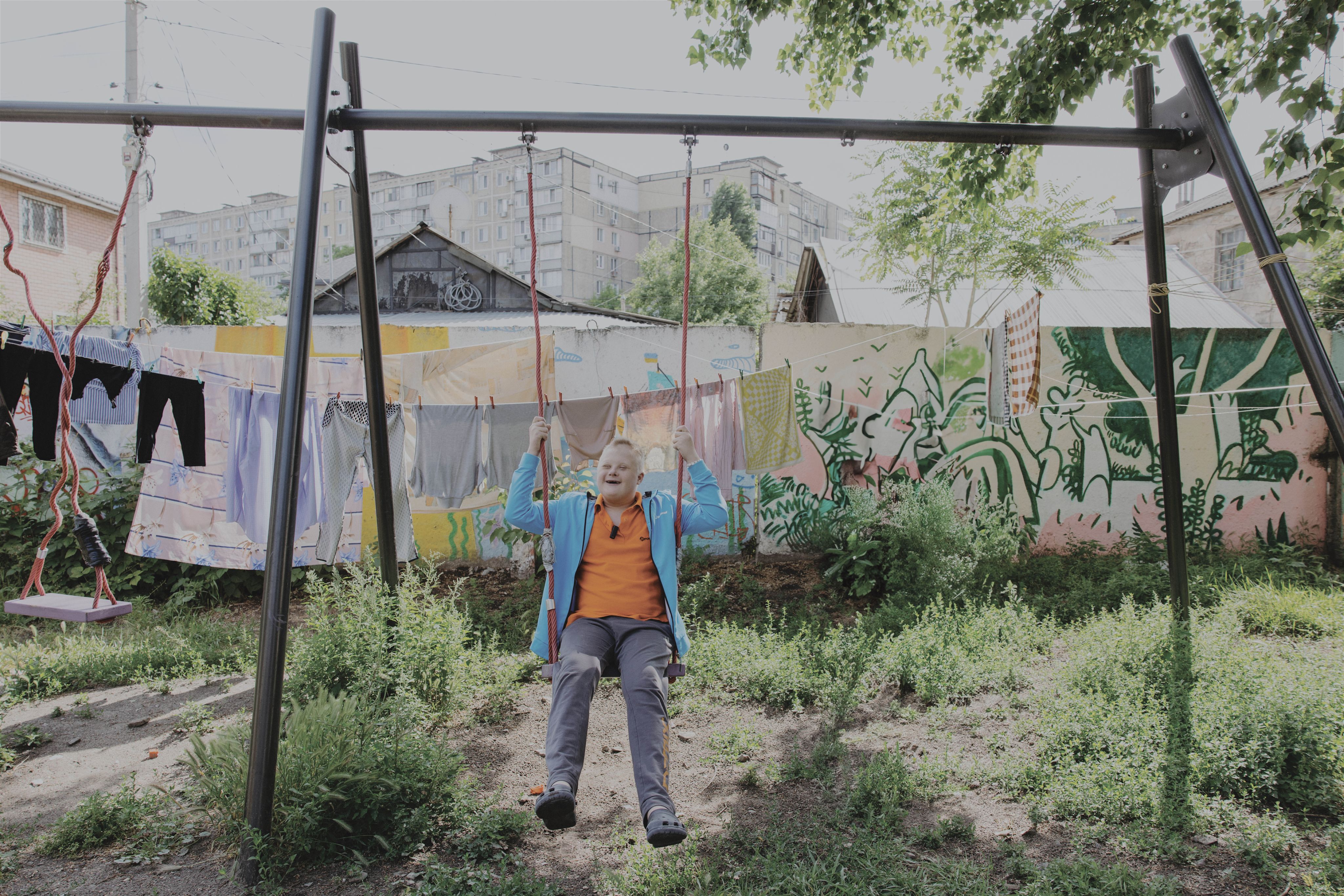
DNIPRO, Ukraine — In peacetime, raising a child with special needs is an immense challenge. Amid the chaos of war, it becomes an overwhelming task. For Olga, originally from occupied Lysychansk in the Luhansk region of Ukraine, and her 14-year-old son Artem, who has Down syndrome, their journey has been one of survival, resilience, and enduring love.
Since 2022, Olga and Artem have been living in a shelter in Dnipro, having fled the perilous conditions of their hometown. "When the first shelling started, Tema would just run around the room," Olga recalls. "Then he would get under the blanket and fall asleep. This is such a protective reaction of his psyche."
A Perilous Journey to Safety
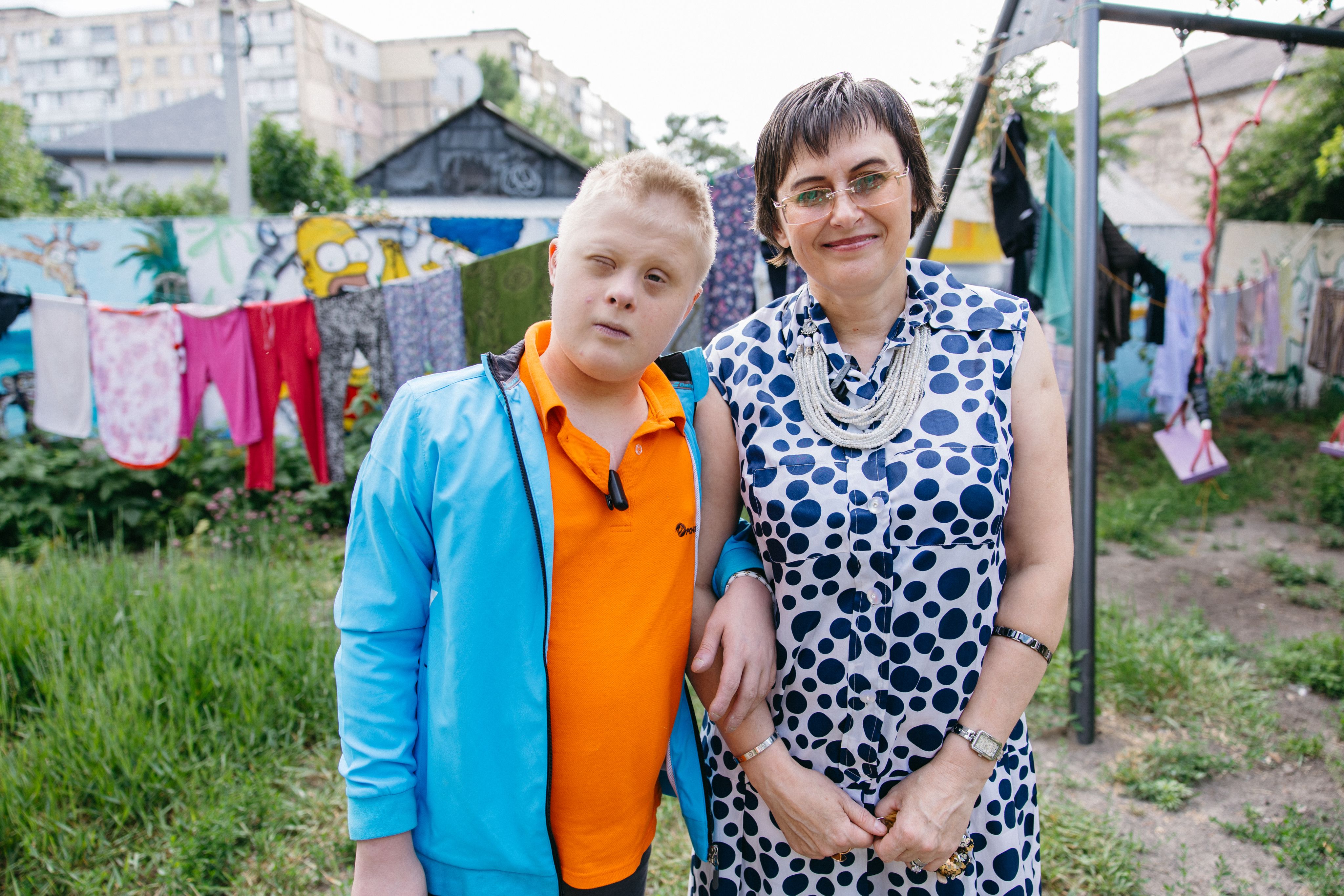
Adapting to a New Normal
Adapting to the constant alarms and explosions has become their new normal. "When there is a lot of noise, I calm him down," she says. In Dnipro, the daily reality includes regular alarms. Recently, a drone was shot down just a five-minute walk from their shelter, sending Artem running to his mother for comfort.
Despite the fear, Artem insists he's not scared. Proudly showing off his biceps, he declares, “I’m strong! Only war... and missiles that fall,” he adds after a moment of reflection.
"Only when I came here did I realize that this would be our home."
The journey to Dnipro was fraught with danger. "When I realized it was getting dangerous to stay home, we left. Thank God there was a car. The road was basically calm, but we saw the bodies of our guys," Olga recounts. They moved several times before settling in Dnipro, first staying with Olga's mother in a village, then in Zaporizhzhya. "Only when I came here did I realize that this would be our home."
Olga's family, like many others, is now divided. Her husband stayed in Lysychansk, and they have since separated. She has two older sons: one lives in Kharkiv, and the other managed to leave for Spain with his family. During the war, Olga also lost her sick mother.
"Of course, it’s difficult when so many different people are forced to share a common space," Olga says. Initially, they shared a room with four elderly individuals. "You can imagine how difficult it was, given the specifics of Artem."
Now, Olga and Artem have a small, separate room, neatly tidied with the aroma of her perfume filling the air. "When we left, I took all my perfume with me! I can't live without them," she laughs. Each bottle evokes a memory, and Artem delights in the scents.
The room is filled with books, a makeshift library to compensate for the one Olga had to leave behind. Cards with letters and numbers hang from a curtain separating the front door and the bed, tools for Artem's learning. Olga shows a hefty book: Artem’s medical record. "Searching for information can take at least 30 minutes when someone asks for something specific," she explains.
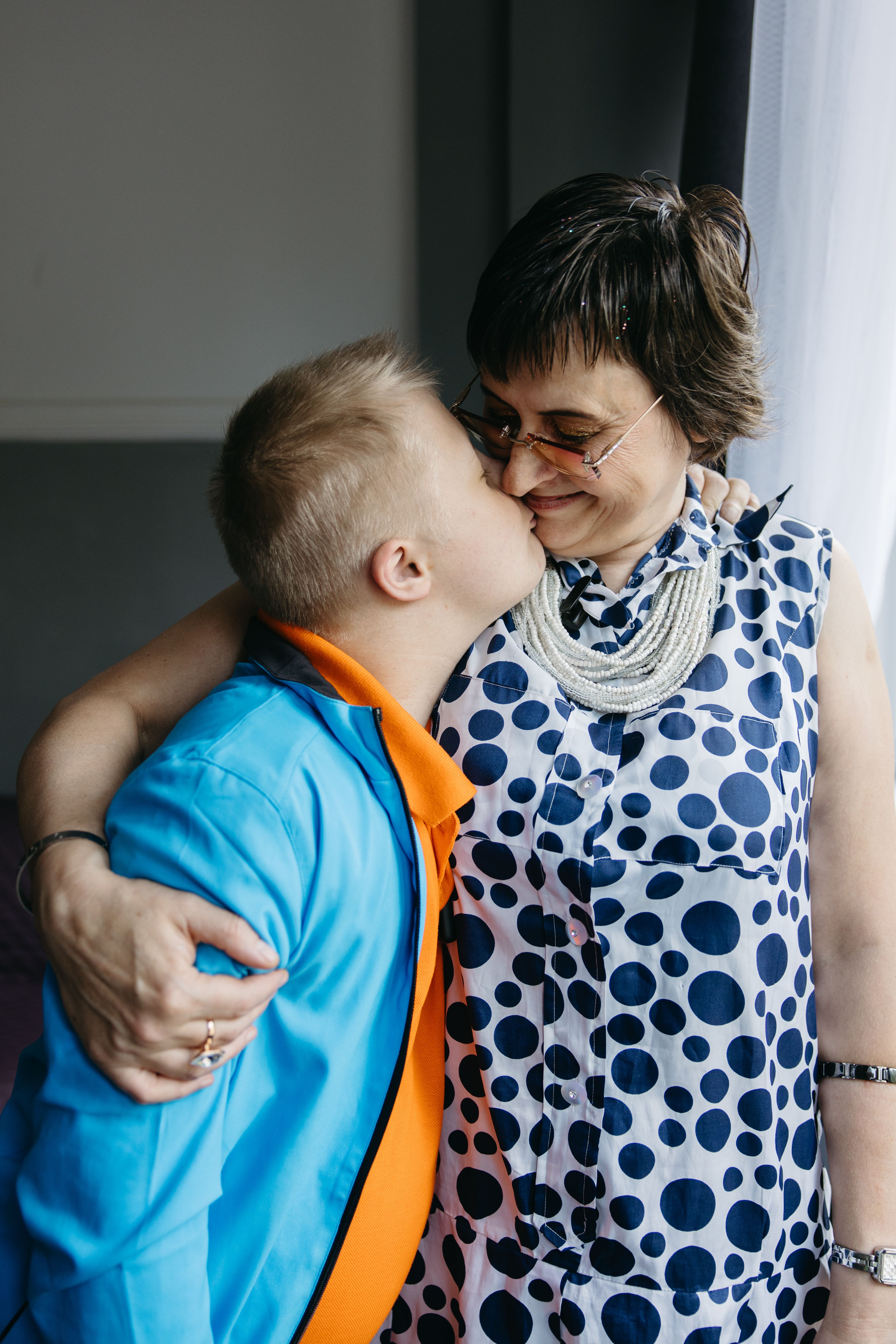
Artem and Olga at the entrance of the shelter.
Artem and Olga at the entrance of the shelter.
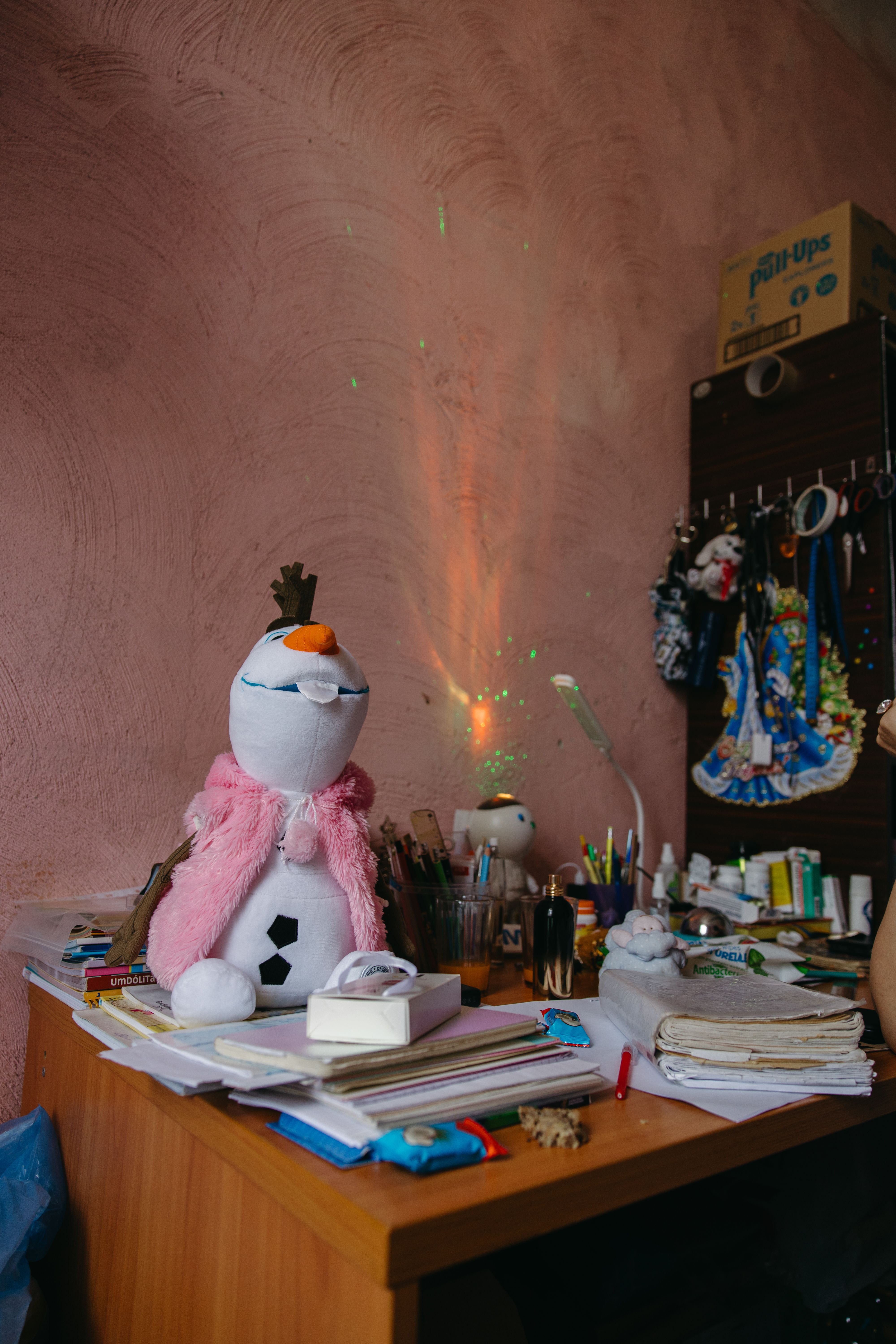
One of Artem's favorite items in the room that he received from the mobile team is a disco light. The bright colors provide a sense of joy in his small room at the shelter.
One of Artem's favorite items in the room that he received from the mobile team is a disco light. The bright colors provide a sense of joy in his small room at the shelter.
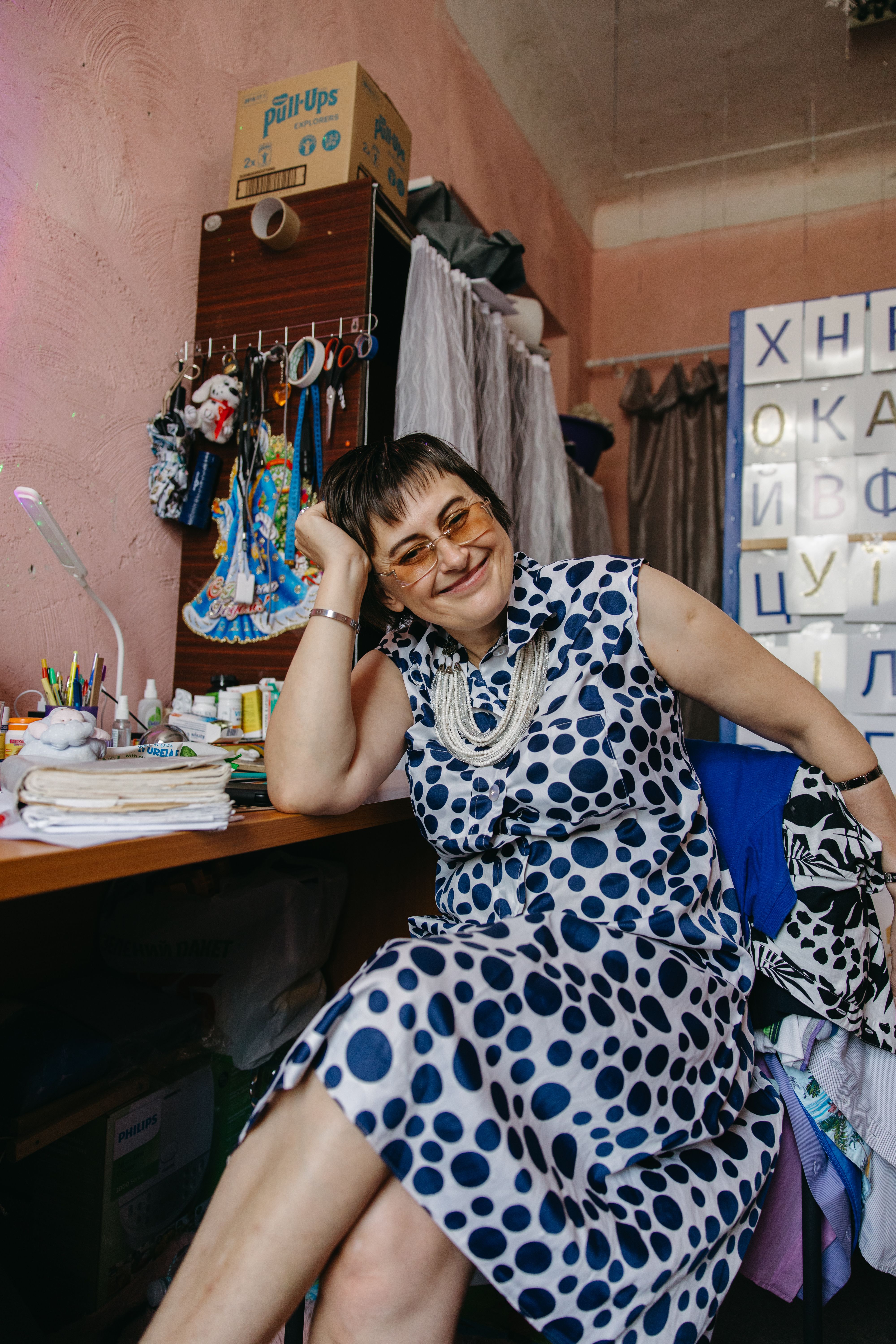
Olga smiles as she shares about her perfume collection. When asked what she brought from home she said "all her perfumes".
Olga smiles as she shares about her perfume collection. When asked what she brought from home she said "all her perfumes".
Overcoming Challenges: Health, Education, and Hope
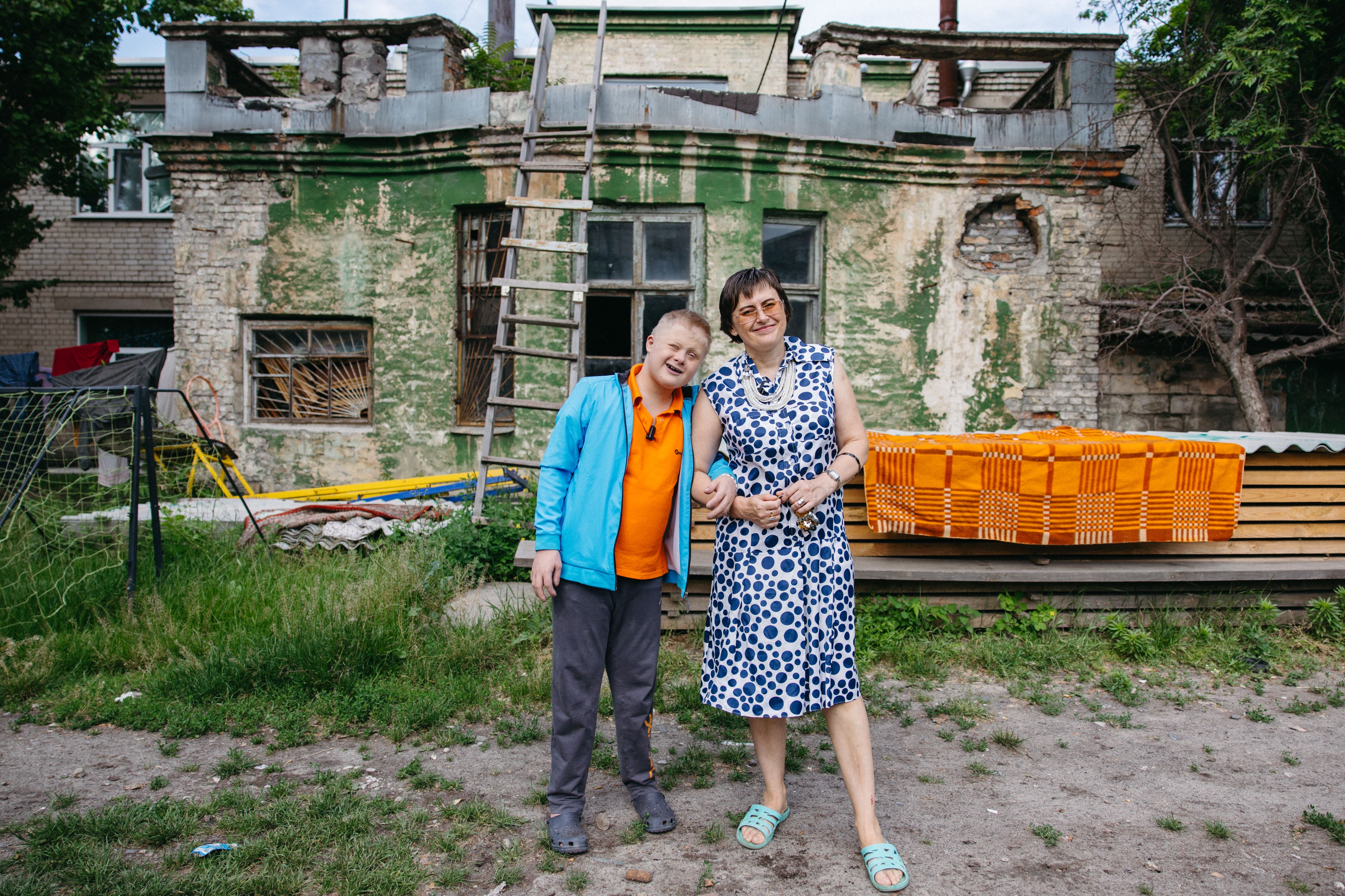
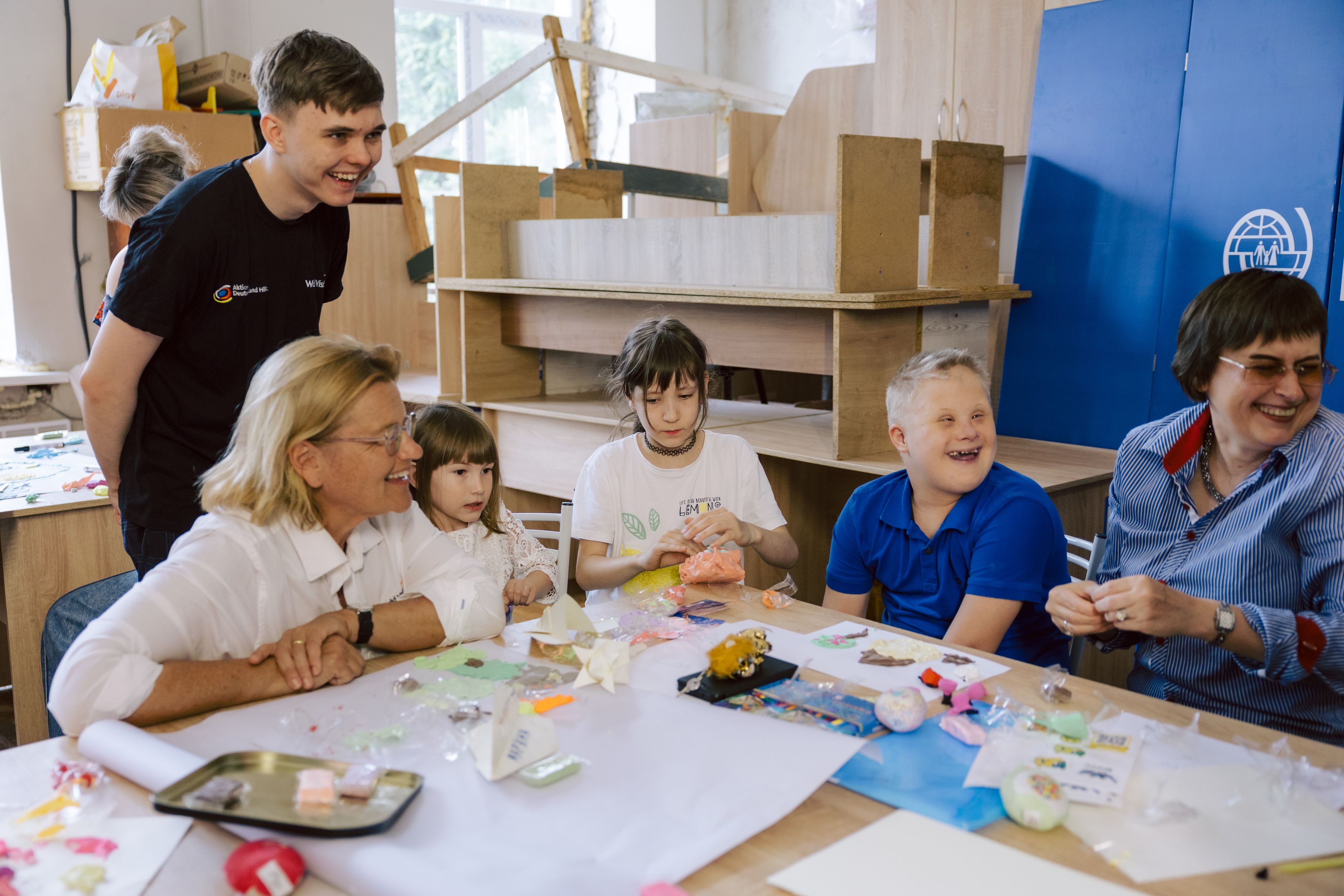
Artem and his friends playing with play dough during one of the art therapy sessions hosted by the mobile clinic.
Artem and his friends playing with play dough during one of the art therapy sessions hosted by the mobile clinic.
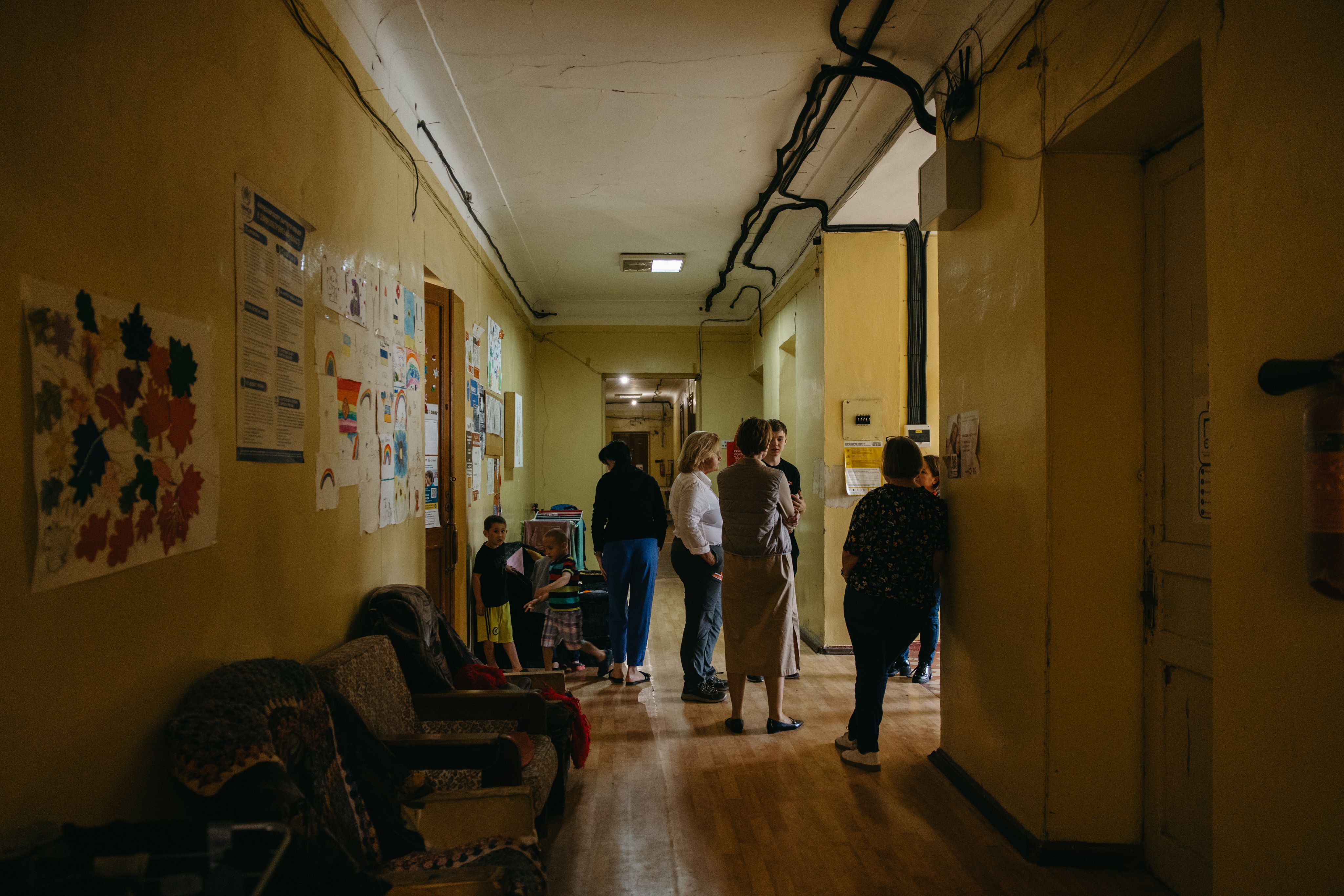
In the hallways of the collective center that houses over 50 internally displaced families.
In the hallways of the collective center that houses over 50 internally displaced families.
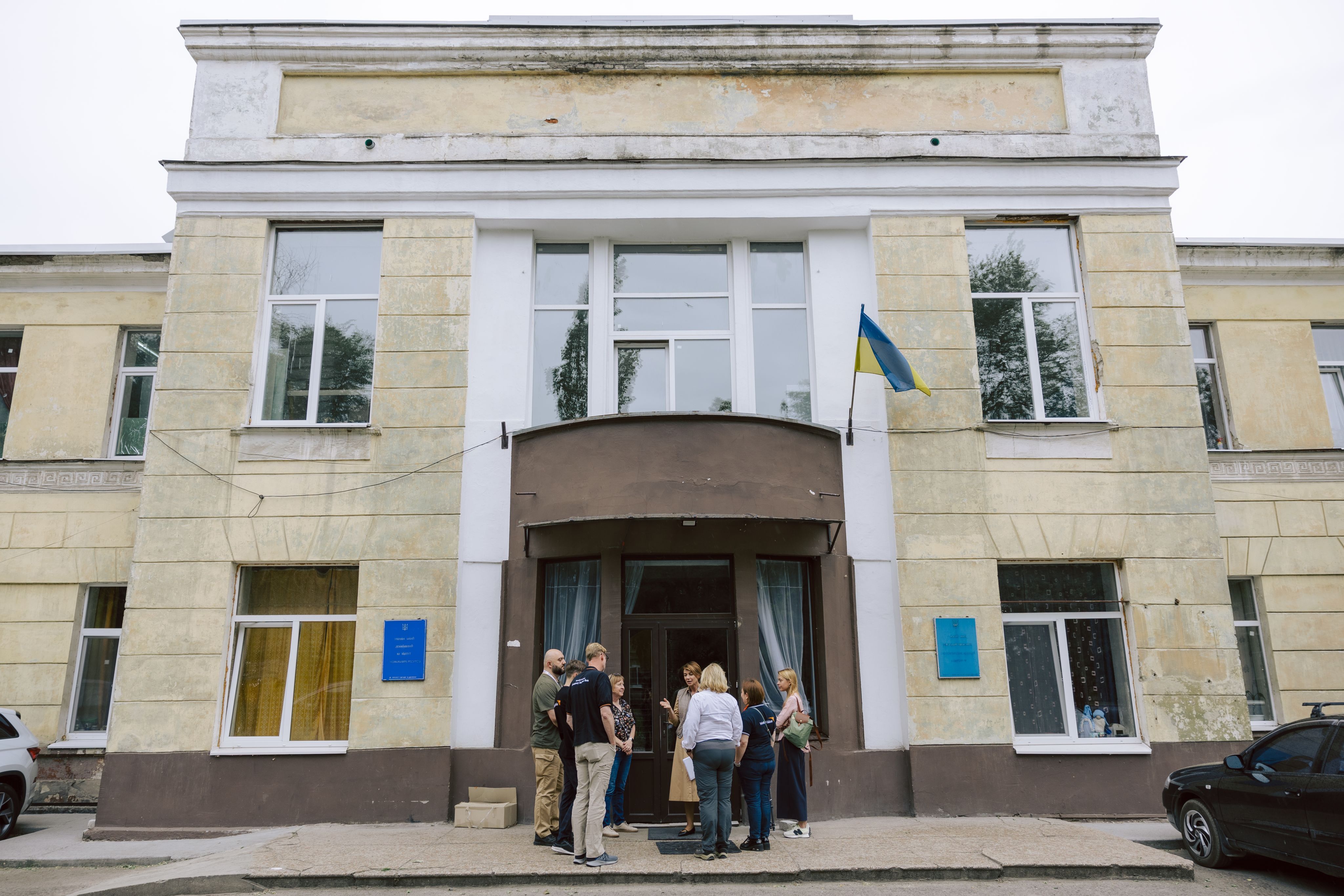
Outside the collective center where Artem and Olga live in Dnipro, Ukraine.
Outside the collective center where Artem and Olga live in Dnipro, Ukraine.
Health and Education Challenges
Artem's Down syndrome is complicated by a heart condition, making even small physical exertions difficult. He spends most of his time indoors, avoiding interactions with other children who can be rude and unaccepting. "For more than five years, I took him to a speech therapist so he could learn to speak. He often repeats my phrases, so I need to express myself carefully."
The lack of special schools in the war-torn region adds to their challenges. "We went to one in Lysychansk, but it’s closed now, of course. He really liked it there; it offered some socialization."
"Raising Artem, it’s as if I’m realizing myself as a teacher..."
Despite the hardships, Olga remains dedicated to Artem’s education and well-being. "Raising Artem, it’s as if I’m realizing myself as a teacher, practicing the knowledge I received at the institute," she says.
Support Systems
The mobile team, run by the Ukrainian Foundation for Public Health (UFPH), World Vision's local partner, and supported through the BHA-funded project, provides invaluable support, especially with art therapy sessions that allow Artem to express himself creatively. "We draw and sculpt from plasticine," Olga says.
As we tour the shelter, Artem proudly shows us his artwork and points out a dilapidated building hit by a rocket, a grim reminder of the war that shapes his perception of the world. In the corridor, he affectionately strokes a kitten, his love for animals evident. "He adores animals; it’s a kind of therapy for him," Olga explains.
Hope For the Future
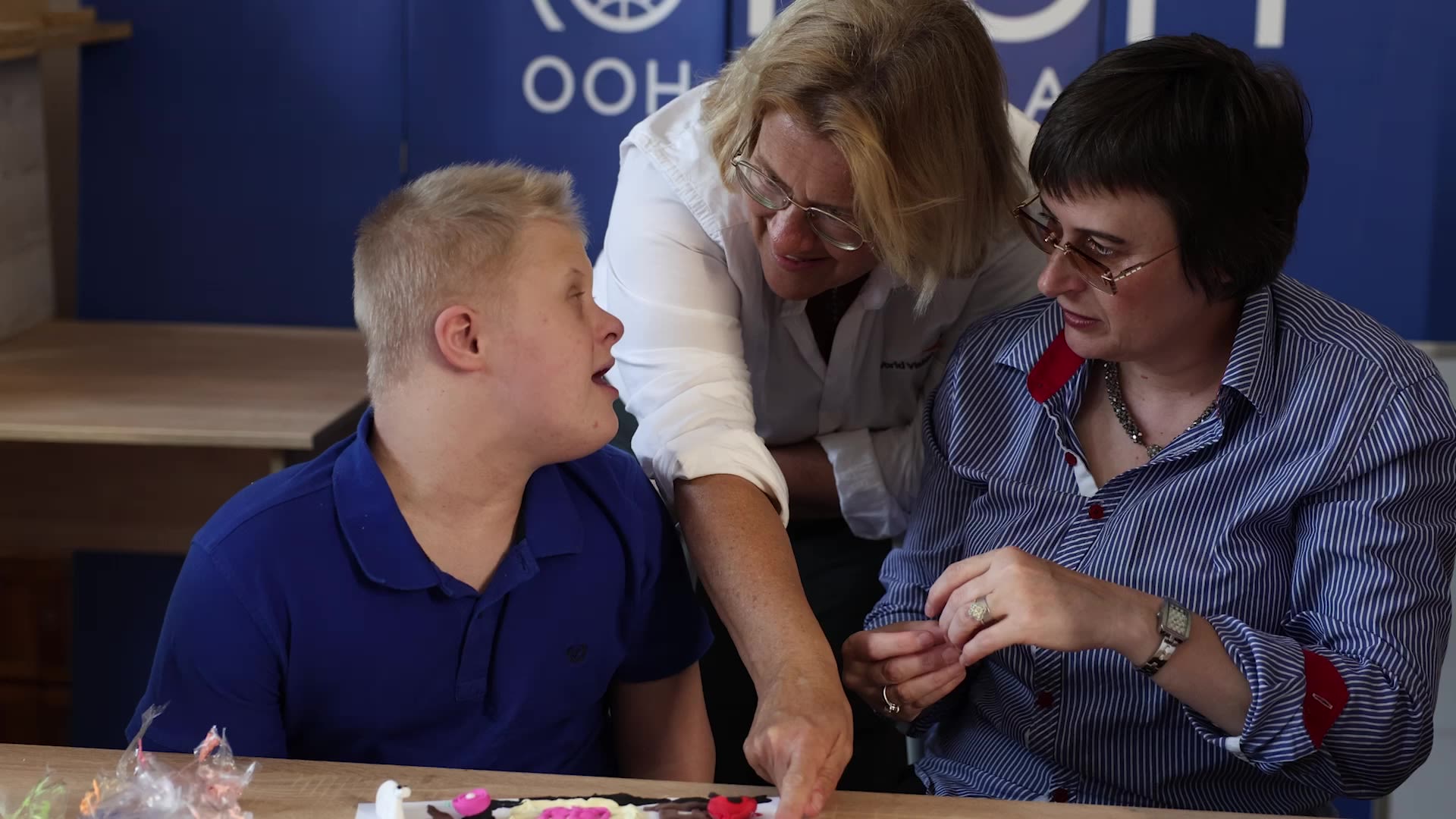
Hope For the Future
Olga and Artem are awaiting surgery for his heart condition. "The doctors in Dnipro are more qualified than in Lysychansk. If everything works out, he will undergo surgery as soon as possible," Olga says, her voice tinged with hope and anxiety.
Despite not being able to work due to her caregiving duties, Olga manages with state support and aid. "We’re not starving, don’t worry!" she reassures. Yet, the financial strain is evident, with vital medications being costly and necessary.
"I can’t imagine life without him. If I had a choice, I wouldn’t change anything," Olga says. "If I were offered the most wonderful life in abundance, I would choose Tema."
"I can’t imagine life without him. If I had a choice, I wouldn’t change anything," Olga says. "If I were offered the most wonderful life in abundance, I would choose Tema."
Olga's journey has transformed her, teaching her to appreciate simple things and deepening her empathy. "The love he gives is the most sincere love," she says, smiling.
Despite the ongoing war and daily struggles, Olga feels grateful for what she has and finds happiness in small joys. Every visit from the mobile team and guests is a celebration. "You are like a breath of fresh air! It’s like entering the world of Narnia," Olga says, her eyes shining.
In the courtyard, Artem picks a dandelion and blows it, laughing. When asked what he wished for, he answers dreamily, “I wished for PEACE.”
World Vision's Response in Ukraine
Olga and Artem live in the collective center where the Ukrainian Foundation for Public Health (UFPH) mobile team, World Vision’s local partner, goes once a month to offer legal, social, and psychological support. The multidisciplinary mobile team for internally displaced families is made up of a psychologist, a lawyer, and a social worker.
Funded by USAID’s Bureau for Humanitarian Assistance, ACTED Ukraine and the Ukraine Response Consortium, they assist around thirty families per day, covering 22 collective centers in Dnipro each month.
Apart from providing legal and psychological support, the mobile team offers packages that include essentials like food and hygiene items. Under the BHA-funded project, 12 mobile teams cover collective centers and schools across the whole country.
These partnerships and World Vision's presence in Ukraine are critical in providing support and safe spaces for mothers and children.